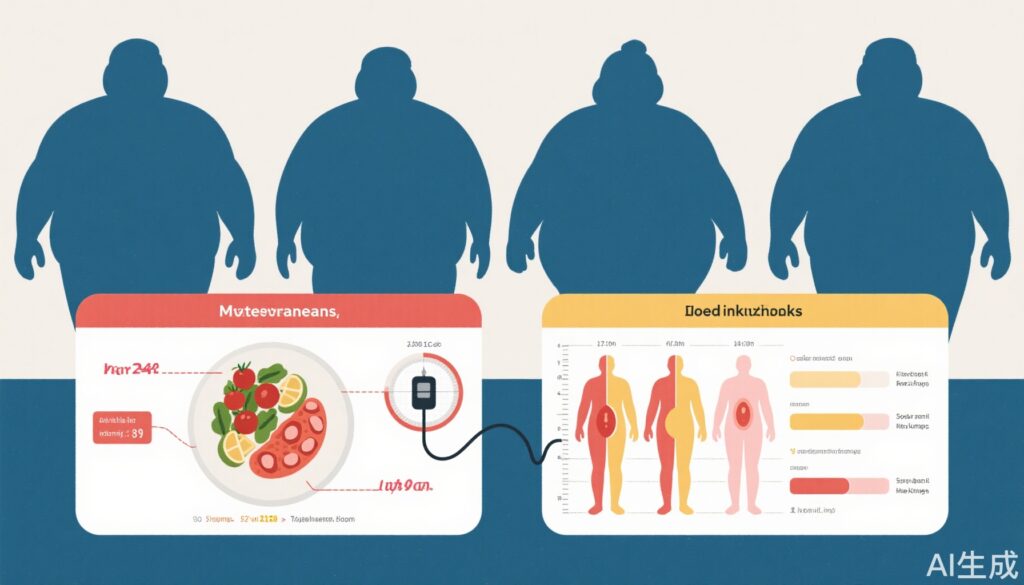Highlights
- Both low-calorie, high-protein ketogenic and low-calorie, low-sodium, high-potassium Mediterranean diets led to significant weight loss and blood pressure reduction in overweight or obese adults with high-normal or grade I hypertension.
- No significant differences in primary or secondary outcomes were detected between the diet groups after three months.
- Improvements in fat mass and fat-free mass correlated with better ambulatory blood pressure results.
- Findings underscore the importance of overall weight and fat mass loss, regardless of dietary approach, in cardiometabolic risk management.
Study Background and Disease Burden
Hypertension and obesity are major contributors to global cardiovascular morbidity and mortality. Patients with high-normal blood pressure or grade I hypertension, especially those who are overweight or obese, face increased risk of cardiovascular events and diabetes. Current clinical guidelines universally recommend dietary modification as the initial intervention in such patients, particularly when overall cardiovascular risk is low-to-moderate. However, the optimal dietary strategy—whether low-carbohydrate ketogenic or Mediterranean-style—remains unclear, and direct comparative data are scarce.
Study Design
The Keto-Salt Pilot Study was a prospective, observational, bicentric study that enrolled 26 non-diabetic, centrally overweight (BMI >27 kg/m2) or obese adults with either high-normal blood pressure (≥130/85 mmHg) or grade I hypertension (140–160/90–100 mmHg) as determined by office measurements. All participants had low-to-moderate cardiovascular risk per SCORE2 estimation. Subjects were assigned to either a low-calorie, high-protein ketogenic diet (KD, n=15) or a low-calorie, low-sodium, high-potassium Mediterranean diet (MD, n=11) for three months. Baseline and three-month follow-up assessments included ambulatory blood pressure monitoring (ABPM), bioelectrical impedance analysis (BIA) for body composition, and comprehensive bloodwork including metabolic biomarkers.
Key Findings
At baseline, the two groups were comparable in demographic, anthropometric, and metabolic variables. After three months of dietary intervention:
- Both groups experienced significant weight loss (KD: from 98.6 ± 13.0 to 87.3 ± 13.4 kg; MD: from 93.8 ± 17.7 to 86.1 ± 19.3 kg; p<0.001) and reduction in waist circumference.
- Ambulatory mean 24-hour systolic blood pressure (SBP) dropped significantly in both groups (from 125.0 ± 11.3 to 116.1 ± 8.5 mmHg, p=0.003), as did diastolic pressure (from 79.0 ± 8.4 to 73.7 ± 6.4 mmHg, p<0.001).
- Fat mass decreased and fat-free mass increased in both groups, reflecting favorable shifts in body composition.
- Blood lipid profiles and insulin concentrations improved significantly in both diet arms.
- The extent of fat mass reduction relative to fat-free mass gain (ΔFM/ΔFFM) was correlated with improvements in ambulatory blood pressure.
- No statistically significant differences between the ketogenic and Mediterranean diet groups were detected for any primary or secondary outcome at follow-up.
Safety was not explicitly reported as an issue, and no major adverse effects were noted in either group over the three-month period.
Expert Commentary
The Keto-Salt study provides valuable, albeit preliminary, evidence that both low-calorie, high-protein ketogenic and Mediterranean-style diets can substantially improve weight, body composition, and blood pressure in overweight and obese adults with early-stage hypertension. The absence of significant between-group differences suggests that the caloric restriction and resultant weight and fat mass loss are the primary drivers of cardiometabolic benefit, rather than the macronutrient composition per se. This aligns with recent guideline statements emphasizing individualized dietary choice and patient adherence as crucial determinants of long-term success.
It is important to note several limitations: the small sample size, short follow-up, lack of randomization, and single-center bias limit generalizability and statistical power. The study population was restricted to relatively healthy, non-diabetic adults with low-to-moderate cardiovascular risk, and extrapolation to higher-risk or more diverse populations should be cautious. Additionally, longer-term adherence, sustainability, and potential adverse effects of each diet were not addressed.
Mechanistically, the observed improvements in blood pressure likely derive from reductions in total body fat, central adiposity, and associated improvements in insulin sensitivity and lipid profiles. The Mediterranean diet’s potassium enrichment and sodium restriction may confer additional vascular benefits, while the ketogenic diet’s high-protein content may help preserve lean mass during weight loss.
Conclusion
In overweight and obese adults with high-normal blood pressure or grade I hypertension and low-to-moderate cardiovascular risk, both a low-calorie, high-protein ketogenic diet and a low-calorie, low-sodium, high-potassium Mediterranean diet can achieve clinically meaningful improvements in weight, body composition, and blood pressure over three months. These findings suggest that dietary preference and sustainability may guide choice between these approaches, with the primary emphasis on caloric restriction and fat mass reduction. Larger, randomized, and longer-term trials are warranted to clarify potential differential effects and to inform evidence-based guideline recommendations.
References
Landolfo M, Stella L, Gezzi A, Spannella F, Turri P, Sabbatini L, Cecchi S, Lucchetti B, Petrelli M, Sarzani R. Low-Calorie, High-Protein Ketogenic Diet Versus Low-Calorie, Low-Sodium, and High-Potassium Mediterranean Diet in Overweight Patients and Patients with Obesity with High-Normal Blood Pressure or Grade I Hypertension: The Keto-Salt Pilot Study. Nutrients. 2025 May 20;17(10):1739. doi: 10.3390/nu17101739 IF: 5.0 Q1 . PMID: 40431478 IF: 5.0 Q1 ; PMCID: PMC12114320 IF: 5.0 Q1 .
Additional references:
– Whelton PK, Carey RM, Aronow WS, et al. 2017 ACC/AHA/AAPA/ABC/ACPM/AGS/APhA/ASH/ASPC/NMA/PCNA Guideline for the Prevention, Detection, Evaluation, and Management of High Blood Pressure in Adults. J Am Coll Cardiol. 2018;71(19):e127–e248.
– Estruch R, Ros E, Salas-Salvadó J, et al. Primary prevention of cardiovascular disease with a Mediterranean diet. N Engl J Med. 2013;368(14):1279-1290.
– Gardner CD, Trepanowski JF, Del Gobbo LC, et al. Effect of Low-Fat vs Low-Carbohydrate Diet on 12-Month Weight Loss in Overweight Adults and the Association With Genotype Pattern or Insulin Secretion. JAMA. 2018;319(7):667-679.



